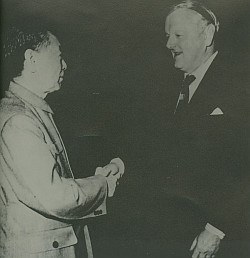Extract from talk given to Rohm and Haas
Shanghai, 20 Sept 2006
Ladies and gentlemen…
There’s a Chinese expression BAN MEN NONG FU that means Wielding an axe at the Gate of the God of Carpentry – it’s a proverb describing the ingénue trying to show off among professionals. And that’s certainly what I’d be doing if I dared pursue this rather ambitious title I’ve been given, and even attempted to give any lessons to such a distinguished and experienced gathering on how to do business in China or anywhere else.

But I have been working here in Beijing for 22 years, I’m the fourth generation of my family to be living in North China, I have enough chutzpah at least to write novels about Chinese history and I work for Jardine Matheson, which as some of you know, has been trading on the China Coast since 1832. So with this as a tentative background, maybe you’ll excuse me if I start with a story about one of our old directors, Sir John Keswick, who was head of the firm from the 1940s until his death in 1982. Nobody knew China better than he. He’d come out to Shanghai in 1931 to join his brother, who was Taipan of the firm. He spoke fluent Chinese. During the war he was Mountbatten’s representative in the Chinese war capital of Chongqing and there he got to know Zhou En-lai and other senior Communists who over the years became personal friends. He personally negotiated the handover of Jardines assets back to China after the Revolution of 1949. Mao thought if China took over the firm they’d have an instant foreign trading corporation. Old JK, virtually a hostage in Shanghai, negotiated patiently for four years, ending up keeping the company in Hong Kong while maintaining Chinese friendship. We’ve never stopped trading since and JK came out here to meet Zhou En-lai, Deng Xiaoping, Zhao Ziyang and his other friends once a year until he died. In his old age he had a book privately printed and entitled: Fifty Years In China: Everything I have Learned. He kept it on the coffee table in his castle in Scotland, and naturally any guest fell on this wonder with reverence. But the first page was blank. So was the second. And the third. And the fourth. In fact, EVERY page in the book was blank…. That was JK’s little lesson to any foreigner who thought he could ever learn about China!
Well, we mustn’t be daunted […] let’s see if between us we can throw some light on that great secret that apparently eluded even John Keswick: how to do business in China?
[…]
A word about Jardines today – my credentials as it were (I’ve been representing them in China for the past 21 years). Despite what novelists like James Clavell would have you believe, we are not the Princely Hong of the imagined past. We are a very modern multinational, specialising in services ranging from insurance broking, to hotels, to real estate, to construction, to shipping, to retail and distribution. In our Group are such well-known names in their own right as Hong Kong Land, Mandarin Oriental, Jardine Lloyd Thompson and Gammon Construction. We’ve just acquired 20% of the prestigious merchant bank, Rothschilds. All of our businesses are involved one way or another with China. We employ over 10,000 people on the Mainland and have more than 50 ventures here. We’ve certainly made our mistakes, some of which I’ll tell you about, but we also have had our successes. And over our 170-year history we have become very, very aware of what is meant by “business with Chinese characteristics”.
Today I would like to look at some of these more permanent characteristics of doing business with China, and I would like to do so from the viewpoint of the foreigner trying to understand what a complex market it all is.
First thing is to discover is with whom you’re actually doing business (believe me, it’s not always obvious) and what makes him tick. The Chinese will certainly be asking the same questions about you. In my experience the Chinese run rings round the foreigners when it comes to background research. The old Han Dynasty general Sunzi said that to defeat your enemy you must first understand him better than you understand yourself. I’ll speak more of Sunzi and his Art of War later, but let me impress this point: understanding the culture of the country is the first step to learning the business practice.
China has a deep cultural well to draw upon, and the Chinese do things, and experience things, and understand things in a very special way, drawing on the wisdom of three millennia of civilisation to shape their strategies. How does an American, or an Englishman or an Australian or a German begin to understand all this? As a middleman I’ve sometimes seen the situation where both sides have absolutely common ground but don’t realise it because they are so locked in their own mindsets; you have to bang heads together to make both sides realise they actually agree!)
So, assume we’ve moved beyond our own first prejudices and beliefs such as the odd one still persisting that Chinese all ride bicycles and wear Mao suits – this despite more TV coverage on China in the west than is expended on any other country. Let’s ask ourselves the question: What’s the secret of doing business in China?
[…]

